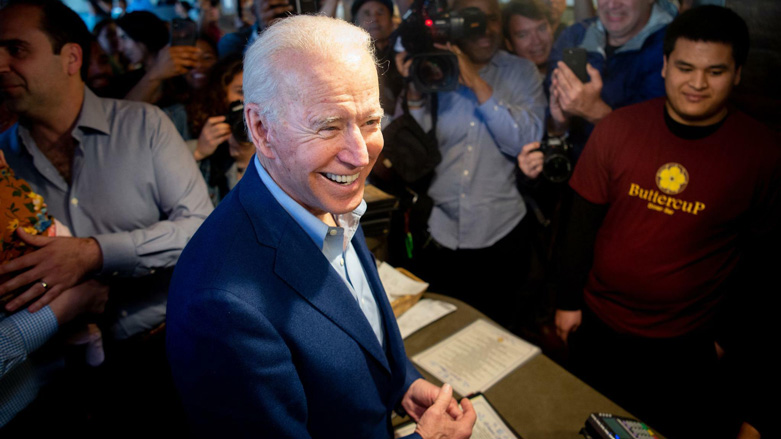Joe Biden surges ahead in Democratic presidential race

WASHINGTON DC (Kurdistan 24) – Former US Vice President Joe Biden took the lead in the contest to become the Democratic candidate for president in November, following primary voting on “Super Tuesday.”
Biden did even better than expected in the elections, which were held in 14 states. Biden won in ten states, while his main rival, Vermont Senator, Bernie Sanders, won in only three—although one of those states, California, is a very big prize.
Biden had a lackluster showing in the early primaries, but he won big on Saturday in South Carolina. That victory prompted much of the Democratic party’s leadership to unite behind Biden in advance of Tuesday’s vote.
Biden’s wins on Tuesday further consolidated that trend. The following day, on Wednesday, Mike Bloomberg, former mayor of New York City, announced that he was withdrawing from the contest and would back Biden.
Biden is the party’s centrist candidate. Sanders is on the left, a populist who has promised his base extensive new social welfare programs and a “revolution.” But as a Washington Post columnist wrote, late on Tuesday, after the results of the polling were largely known, “the Sanders revolution has failed.”
Wall Street appeared relieved at Biden’s strong showing vis-a-vis Sanders, and the stock market surged on Wednesday, with the Dow Jones industrial average rising 800 points and recovering from steep losses caused by the outbreak of the coronavirus.
Biden’s Friendship with the Kurds
Joe Biden has a long-standing friendship with the Kurds, both as a senator and later as Barack Obama’s vice president. In 2007, as the top Democrat on the Senate Foreign Relations Committee, along with Sam Brownback (R, Kansas), Biden sponsored a bipartisan, non-binding resolution calling for federalism in Iraq and the decentralization of authority in Baghdad.
By a vote of 75 to 23, the Senate overwhelmingly approved the Biden-Brownback resolution.
Read More: Super Tuesday: Joe Biden and the Kurds
The resolution was welcomed by the Kurdistan Regional Government, although it was rejected by Iraq’s Arabs, Sunni as well as Shi’ite. Thirteen years later, however, it is evident that the Sunnis made a serious mistake. They would have been much better off, if they had joined the Kurds in endorsing the proposal.
Similarly, the passage of those thirteen years also suggests that there was a great deal of wisdom behind the Biden-Brownback resolution. Iraq’s current political system has not worked since its establishment in 2003, following the overthrow of Saddam Hussein’s regime.
As is now evident, the Bush administration was far too sanguine in its embrace of the notion that democracy could cure the ills of the Middle East.
According to Iraq’s 2005 constitution, its government was supposed to be a federal system. Yet as experience would show, power-sharing was an alien practice in Baghdad, and Iraq’s rulers soon reverted to long-established habits, replacing Sunni Arab domination with that of Shi’ite Arabs.
Time to revisit the Biden-Brownback Resolution?
Col. Norvell DeAtkine (US Army, Retired), former director of Middle East Studies at the US Army’s John F. Kennedy Special Warfare Center and School at Ft. Bragg, suggested to Kurdistan 24 that it was time to revive a serious consideration of the concepts behind the 2007 Senate resolution.
“Particularly with what’s going on now, Iraq being subverted by the Iranians,” DeAtkine said, “there’s no reason why the Kurds should be sucked into it,” adding, “or the Sunnis for that matter.”
Indeed, poor governance, including sectarianism, has left Iraq without a cabinet for the past three months. On Nov. 30, Prime Minister Adil Abdul Mahdi resigned, in response to ongoing protests against corruption, poor services, and high unemployment.
On Feb. 1, Mohammed Tawfiq Allawi, who had been Minister of Communications in earlier governments, was named prime minister. But Allawi failed to accommodate Kurdish and Sunni interests, despite being urged to do so by US Secretary of State Mike Pompeo.
Read More: Pompeo calls on Iraqi Prime Minister-Designate to work with Kurds, Sunnis
John Hannah, National Security Adviser to Vice President Dick Cheney during the George W. Bush administration, writing in Foreign Policy, described Allawi as “an Islamist-leaning Shiite,” whose candidacy was “clearly born of a backroom deal brokered by an Iranian axis.”
“In cabinets marred by thievery,” Hannah wrote, further explaining Allawi’s nomination, he “reputedly was less corrupt than his colleagues.”
Yet Allawi did not succeed in gaining the Iraqi parliament’s approval of his cabinet and late last week announced he was withdrawing his candidacy, a move welcomed by Masoud Barzani, head of the Kurdistan Democratic Party.
Next Steps in America’s Democratic Race
With Tuesday’s results, the Democratic field has narrowed to essentially two candidates: Biden and Sanders. Primary races remain ahead of the party’s convention in July. They include important states, with large populations, and large numbers of convention delegates, including New York and Illinois.
As those primaries proceed, and assuming that they replicate the results of Tuesday’s vote, it is expected that the Democratic leadership will increasingly seek to pressure Sanders to drop out, so the party can unite ahead of the November elections. However, it is also expected that Sanders will strongly resist such pressure.
Editing by John J. Catherine
